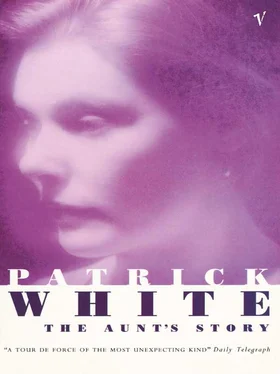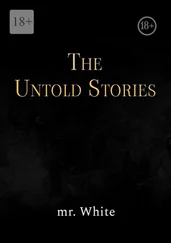Theodora knew that she had laid her face against the window and was speaking into glass.
‘I like the garden best when it is still and cool.’
‘The garden is always detestable,’ the General said.
‘Look, Alyosha Sergei, what is this plant with the big damp leaves that are full of holes?’
‘That is Monstera deliciosa . Its fruit is eaten when black, and one would say, almost putrid.’
‘How peculiar.’
‘You will find, my popinjay, that much that happens comes as a surprise, and much that doesn’t happen is still possible.’
A chair creaked. The General’s chair, perhaps, had aching thighs.
‘Come here, my sweetheart, my Varvara. I have a present for you. A prize for prettiness.’
‘A present! Let us open it, Alyosha Sergei, and see.’
‘Oh, it is nothing. Let me assure you in advance. It is a small box of marshmallows that seems to have become a little crushed in transit.’
‘But, Alyosha Sergei, how kind.’
‘Knowing the sweet tooth of all young ladies …’
‘One Easter they gave me a box of marshmallows. When I was thirteen. And I ate them all. I ate till I was sick. It was quite lovely, I remember, but I was thirteen.’
‘Now you are sixteen,’ the General said. ‘And I shall help you eat these. You shall pop one carefully in my mouth.’
Theodora was glad that she did not see the great rubber lips reach forward, tremble, and close. But at least she heard the smack.
‘There,’ said Katina Pavlou. ‘Now your face is powdered.’
She laughed.
‘Alyosha Sergei,’ she laughed, ‘now your face is the face of a clown.’
‘Let us at least eat the sweetmeats,’ the General said. ‘Until we are sick.’
‘I have not hurt you, have I, Alyosha Sergei?’
‘I have not been hurt since I was shot in my left buttock running away in the dark.’
‘How ridiculous you are!’
‘Then you do not love me? A little?’
Theodora heard the rubber silence lean over steamily to touch.
‘Of course, I adore you. If I did not, I would not kiss you. There!’
‘It is usual also, I believe, to call one’s lover by endearing names.’
But Katina Pavlou laughed. It bared Sokolnikov, it bared him to the soul.
‘I shall call you,’ she laughed, ‘I shall call you …’
‘Yes?’
‘I shall call you my Monstera deliciosa . But you are not yet putrid enough.’
Theodora heard Sokolnikov contract.
‘Oh, dear!’ Katina Pavlou laughed. ‘How ridiculous we are. I must dry my eyes. But now we shall be solemn. We shall sit, and you shall tell me, General Sokolnikov, about some campaign.’
‘I do not think, after all, I am in any mood for conversation,’ said Sokolnikov.
‘You are sad, Alyosha Sergei? I was sad before you made me laugh.’
‘Are you in love, Katina Pavlou?’
‘No,’ she said. ‘I am not in love. I have not yet been in love.’
And Theodora Goodman knew that Katina Pavlou had stood against the window, beyond which, in the still greyness of the afternoon, the waves folded and unfolded, endlessly, their receiving and rejecting hands.
Theodora put the indeterminate garment she was knitting into its appropriate bag. She coughed the cough that never does deceive. In the little transparent wintergarden she felt that they were all three considerably exposed.
‘Oh, it is you,’ the General said.
He was cold. Since the evening of the nautilus both Mrs Rapallo and Sokolnikov had avoided her, as if mirrors tell.
‘Yes,’ said Theodora, ‘it is I.’
Sometimes even grammar is unavoidably exposed. She looked outside, the garden side, at the big damp leaves of the Monstera deliciosa which were full of holes.
‘This room is quite horribly naked,’ Sokolnikov complained.
Katina Pavlou held her face against the window. She was closed now, opaque. She sang her own song, in her own language, whether of love or death, it had its own to and fro.
‘I would like one day to make a picnic beside the sea,’ Katina Pavlou said. ‘Let us make a picnic, Miss Goodman. And you shall come, Alyosha Sergei. And we shall ask …’
‘Child, I am too old for rocks.’
And cold, Sokolnikov was cold.
‘So I have been informed,’ he said. ‘Now I shall go and clean my spurs. It is Thursday afternoon.’
‘But you shall come,’ Katina Pavlou called. ‘We shall talk.’
‘Oh, yes, we shall talk,’ the General said. ‘It is a small hotel. You shall have many opportunities to tell me things.’
But his feet marked some slow rubber repugnance on the stairs.
‘There. He has gone, poor thing. And I have hurt him,’ Katina Pavlou said.
‘He will rebound,’ said Theodora. ‘He will even sit on rocks.’
‘Then we shall make this picnic, Miss Goodman?’
‘I dare say it will be made,’ Theodora Goodman said wryly, remembering another stiff group beside the church.
‘I am so glad,’ Katina Pavlou sighed.
She turned her face against the glass, and then, unaccountably, began to cry. For Katina Pavlou had become the amazed and frightened instrument recording some climatic disturbance, still too sudden to accept or understand.
‘Dearest Katina,’ Theodora said, ‘it would be easier if you would tell.’
‘It is nothing,’ cried Katina Pavlou.
The windows of the little wintergarden, blurred by the action of the salt air, did not disclose. There was no guide. There was only a general and continuous, consuming sea sound.
‘Dear Miss Goodman, I wish that I could tell. I wish that I knew,’ Katina Pavlou cried. ‘But it is nothing. Nothing. Nothing at all.’
So it is to take place then, Theodora knew. The picnic will disclose. There will be stuffed eggs, and conversation, and silences, and swords. But the picnic will be made. Already the little wintergarden could not contain the event. It pressed, it brimmed, rustling with the barely suppressed wind of excitement the brown bodies of dead flies.
‘A picnic?’ Mrs Rapallo said. ‘How queer. And how uncomfortable.’
She propelled her words outward like deliberate amethysts, which she then observed, with some pleasure and some distaste, from beneath bluish skin.
‘I was never one for the alfresco,’ said Mrs Rapallo. ‘Life was intended to be lived indoors. At its most intense it smells of gardenias.’
Since the night of the nautilus she had shrunk. But she came. She came to the picnic, still dubious whether grass offered much beyond moisture, and whether the elaborate machinery of the waves would soothe.
‘I shall put myself here,’ she said, patting an orange rock with scorn.
Mrs Rapallo had to settle her magenta, compose her crimson, tilt her great jaundiced hat, before she could suffer the sun, if only obliquely, from under her parasol.
‘There,’ she said. ‘There is now some design in nature.’
And she sniffed at the red trunk of an offending pine.
Soon the landscape had begun to fit. The air withdrew its obliviousness. It stroked. The sea moulded the human form into tolerant shapes. How far the sun condescended was seen in the face of Katina Pavlou, its open, golden petals, with the dark seeds for eyes. Theodora waited for Katina’s eyes to germinate. She watched for the expanding of some mystery that she had already guessed at and rejected.
‘If you open your hand I shall tell you a fortune,’ said Wetherby as he reached forward and took the fingers of Katina Pavlou.
‘No,’ she said. ‘There is still eating to be done.’
She withdrew her hand. She could not answer for the behaviour of her bones.
‘How right you are,’ Lieselotte laughed.
She lay on her back, chewing with her small teeth the sweetness from a piece of grass.
Читать дальше












